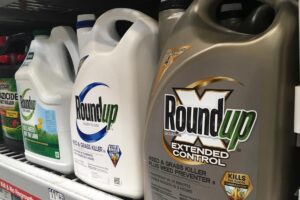Monsanto’s Legal Battles Intensify: A $2.1 Billion Verdict for Roundup’s Cancer Claims
In a significant ruling that has sent shockwaves through the agrochemical industry, a jury in Georgia has found Monsanto, now a part of Bayer AG, liable for $2.1 billion in damages to John Barnes, a man whose non-Hodgkin lymphoma was reportedly caused by the company’s widely used Roundup herbicide. This verdict represents one of the most substantial legal setbacks for Bayer since its controversial acquisition of Monsanto in 2018, further complicating the company’s ongoing litigation strategy surrounding its flagship product.
A Landmark Verdict and Its Implications
The jury awarded $65 million in compensatory damages and an astounding $2 billion in punitive damages, marking a critical chapter in the ongoing narrative of Roundup litigation. This verdict has been heralded as a "milestone" by Barnes’ attorney, Kyle Findley, who expressed hope that it would provide much-needed resources for his client’s treatment and signal a broader conversation about accountability in agribusiness.
With over 177,000 lawsuits linked to Roundup, it’s clear this case is just one piece of a vast legal puzzle. Bayer’s decision to appeal reflects its intent to challenge the verdict vigorously and uphold the claims of Roundup’s safety, which stands in stark contrast to the sentiments expressed by countless plaintiffs.
Bayer and Monsanto: A Troubled Legacy
Bayer has maintained that the claim linking glyphosate, Roundup’s primary ingredient, to cancer lacks scientific support and has repeatedly emphasized the consensus of regulators who deem glyphosate safe when used as directed. However, the overwhelming number of lawsuits makes it challenging for the company to sway public perception and investor confidence, especially as new evidence continues to emerge.
Recent comments from Mossanto suggest a strategy focused on discrediting the findings of various studies that implicate glyphosate in serious health risks. The agrochemical giant argues that the latest jury verdict does not align with the existing scientific evidence and regulatory assessments worldwide.
The Bigger Picture: The Agricultural Landscape
Roundup was initially lauded for its efficiency in weed control, particularly for crops like corn, soybeans, and cotton that are genetically modified to be resistant to the herbicide. This innovation allowed farmers to increase productivity while adopting more sustainable farming practices, such as reduced tillage. However, the ongoing litigation raises significant questions about the trade-offs inherent in modern agricultural practices.
As Bayer seeks to navigate this complex legal landscape, it’s also engaging in legislative efforts to shield pesticide manufacturers from lawsuits claiming they failed to warn consumers of cancer risks, as long as their products comply with EPA regulations. Supporters argue these measures are necessary to ensure the availability of crucial agricultural products, but opponents assert that they pave the way for diminished accountability.
A Future of Uncertainty
With more lawsuits on the horizon and the potential for substantial financial liabilities, the stakes have never been higher for Bayer. The outcome of this recent verdict not only impacts those directly affected but may also set a precedent for future cases related to agricultural chemicals and public health.
As we delve deeper into the implications of this verdict and the broader issues of corporate accountability in the agricultural sector, it is crucial for investors to stay informed. The intertwining of legal battles, corporate strategy, and market responses will likely shape the landscape of agribusiness for years to come. The Extreme Investor Network is committed to tracking these developments closely, providing our audience with exclusive insights and analyses to navigate this evolving narrative. Stay tuned as we continue to unpack the story behind this landmark ruling and its potential consequences for the investment community.

